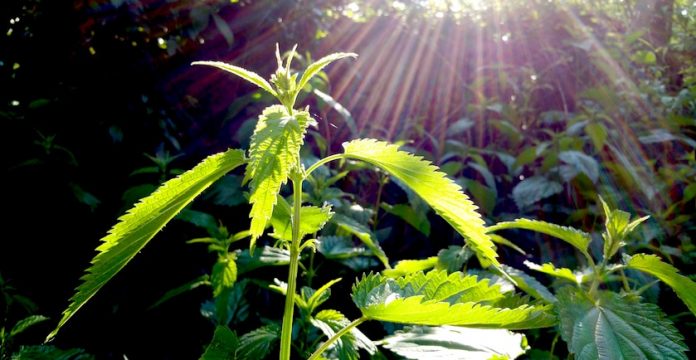
The herbal pharmacy is abundantly stocked with many wondrous healers. Nettle is no stranger to that list, boasting numerous human health benefits that have been time-tested through the ages.
If you're a seasonal allergy or hayfever sufferer who follows a natural diet and lifestyle, then the nettle plant may already be a lifesaver. And there are other benefits to this unsuspecting looking weed that may be useful in your health care as well.
Read more about natural remedies for dry, itchy eyes
The stinging nettle is a variety of the common nettle and gets its name from the fine, stiff hairs on the underside of its heart-shaped leaves. When touched, the plant releases a chemical through the hairs that can feel like you're being stung or pricked by a cactus. You can, however, eat nettles like most any other leafy green vegetable, but the leaves must be cooked thoroughly to deactivate the stingers. Stinging nettles are a good source of iron, calcium, vitamin A and vitamin K, and taste a good bit like spinach.
As an herbal remedy, stinging nettle has been valued for its anti-allergy benefits for centuries. While common allergy medications (antihistamines, decongestants) most often focus on relieving those irritating symptoms-itchy eyes, sneezing, difficulty breathing-they don't necessarily get to the root of the issue, which is the body reacting to a certain trigger. Nettles contain complex natural antihistamines that are able to actually block the body's response to allergens, and rather than just relieve symptoms (which a dose of nettles can do), they can also help the body effectively fight the urge to have allergic reactions to those invisible triggers such as pollen. Nettles' immune-boosting properties can effectively help improve the body's ability to fight off allergy triggers (and other immune suppressors), meaning allergies can become less severe over time.
And, of course, as a 100 percent natural plant product, the mighty nettle plant offers you all of this without the common side effects (irritability, headaches, dry mouth, insomnia) of over-the-counter and prescription allergy medications.
Nettle is also a potent anti-inflammatory agent, which can help to greatly relieve the symptoms of hayfever, such as sinus congestion and swollen lymph nodes. Beyond its allergy-relieving benefits, stinging nettles have also been linked with treating a number of other health issues including arthritis, PMS, dandruff, gingivitis, gout, kidney stones, bladder infections and bursitis. It has also been studied for use in treating more serious diseases including multiple sclerosis and Alzheimer's disease. It may even protect against prostate enlargement.
While more research is still needed on using nettles to treat complex conditions like Alzheimer's, it can be effectively employed in battling seasonal allergies. Take it as a tea, supplement or tincture; it can most often be taken safely at any age (and even during pregnancy). Always check in with your primary care physician before adding an herbal supplement to your diet. And never discontinue prescription medication without approval from your physician.
Read more about how to make herbal tinctures
[Editor's Note: Nettles is most effective in treating hay fever and seasonal allergies. It's not an effective treatment for a severe food allergy such as nuts or shellfish, or for people prone to anaphylactic allergic reactions.]
Resources:
herbwisdom.com/herb-nettle.html










